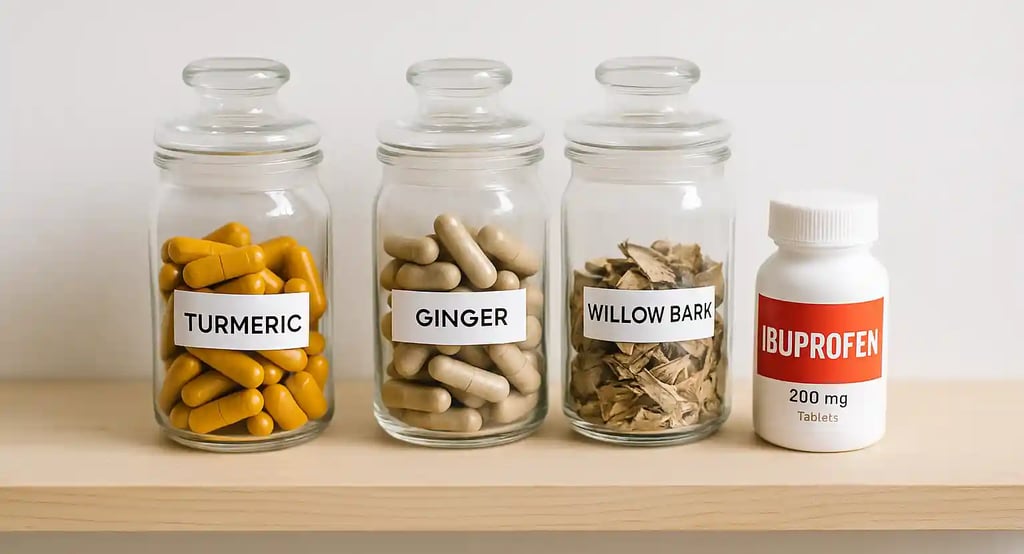Natural Alternatives to Ibuprofen: Safer Options for Pain Relief & Inflammation
Looking for natural alternatives to ibuprofen? Learn about turmeric, ginger, omega-3s, willow bark, and lifestyle changes that may help with pain and inflammation.


Natural Alternatives to Ibuprofen: Safer Options for Pain Relief & Inflammation
Many people use ibuprofen to treat pain, headaches, cramps, and inflammation. While effective, it can cause side effects such as stomach irritation, kidney strain, or cardiovascular risks, especially when taken often or for long periods. Because of this, many people also look for natural alternatives that may provide relief but without carrying risk.
Natural remedies generally do not work as quickly or as strongly as ibuprofen, but some have been studied for their ability to reduce pain and inflammation over time. Options such as turmeric, ginger, omega-3 fatty acids, and willow bark have shown promising results. Lifestyle changes, including diet and exercise, can also play a role in reducing inflammation naturally.
Choosing a natural alternative depends on the type of pain you’re experiencing, your overall health, and possible interactions with other medications. Below, we’ll explore some of the most common questions people have about replacing or reducing ibuprofen with natural remedies.
FAQ
What are the most effective natural alternatives to ibuprofen?
Turmeric, ginger, omega-3 fatty acids (fish oil or flaxseed), willow bark, and green tea extract are among the most studied. These compounds have shown anti-inflammatory or mild pain-relieving effects.
Can turmeric really reduce inflammation like ibuprofen?
Turmeric’s active compound, curcumin, works on some of the same inflammation pathways as ibuprofen. Its effects are generally milder, and absorption improves when paired with black pepper extract (piperine).
Is ginger a safe pain reliever?
Yes, ginger is generally considered a safe natural pain reliever for most people. It contains compounds with anti-inflammatory and antioxidant properties that can help reduce pain and swelling. Research has shown benefits for conditions like osteoarthritis, menstrual cramps, and exercise-related muscle soreness.
That said, ginger is not completely risk-free. Some individuals may experience mild side effects such as an upset stomach, heartburn, or diarrhea, especially if taken in large amounts. In addition, ginger can interact with certain medications, particularly blood thinners, and may increase the risk of bleeding. Because of this, it’s best to talk with a healthcare professional before using ginger regularly as a substitute for ibuprofen or other pain relievers.
How does omega-3 compare to ibuprofen?
Omega-3 fatty acids (EPA and DHA) may help with joint stiffness and pain from chronic inflammation. While not a fast-acting pain reliever, they can reduce inflammation when taken consistently.
What about willow bark?
Willow bark contains salicin, similar to aspirin. It has been used for centuries to treat pain and fever, and may help with back pain or osteoarthritis. However, it can also irritate the stomach and should be avoided by people that are allergic to, or get reactions from, aspirin.
Are natural alternatives always safer than ibuprofen?
Not always. Natural remedies can still interact with medications, cause side effects, or are just generally less effective than Ibuprofen for severe pain. Always discuss your options with a healthcare provider and come up with a direction that works for you.
Can lifestyle changes reduce the need for ibuprofen?
Yes. Regular exercise, maintaining a healthy weight, stress management, and following an anti-inflammatory diet may lower chronic pain and inflammation.
Disclaimer
This page summarizes information from trusted medical sources and is provided for general knowledge only. lt is not medical advice; Always consult your doctor or pharmacist for personal medical guidance (For a more comprehensive explanation please see the full disclaimer).
Resources
The information above has been gathered from several reputable sources, including the following:
[1] PubMed - Turmeric
[3] PubMed - Ginger




